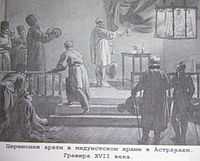Hinduism in Russia



Hinduism has been spread in Russia primarily due to the work of missionaries from the Vaishnava Hindu organization International Society for Krishna Consciousness and by itinerant swamis from India. There is an active Tantra Sangha operating in Russia. According to a 2010 religious census there are 140,000 Hindus in Russia.[1] Most of them are Indian nationals residing in Russia along with some local converts to various Hindu movements.[2]
Hindu organizations in Russia
Hindu groups which have presence in Russia are the International Society for Krishna Consciousness, Brahma Kumari, Ramakrishna Mission, Ananda Marga, the organizations associated with Maharishi Mahesh Yogi, Sahaja Yoga, Chinmaya Mission, Satya Sai Baba and Osho Rajneesh. While ISKCON and Brahma Kumari appear to have a relatively strong following in Russia, the other organizations in the list have a marginal presence in this country. As of December 2005, the Federal Registration Service recorded the number of registered Hindu groups listing Hindu group and Hindu groups with particular orientation on Krishna (78) and Tantric sects (2).[3]
Krishnaism
As of December 2005, the Federal Registration Service of Russia has registered 78 Krishnaite communities.
Slavic Vedism
Slavic Vedism, Slavic Hinduism, or Neo-Vedism or simply Vedism[4][5] are terms used to describe the contemporary indigenous development of Vedic forms of religion in Russia, Siberia, other Slavic countries, the Commonwealth of Independent States' members and generally all the post-Soviet states.
Slavic Vedism involves the use of Vedic rituals and worship of ancient Vedic deities, distinguishing from other groups which have maintained a stronger bond with modern Indian Hinduism, although Krishnaite groups often identify themselves as "Vedic" too. Also some syncretic groups within Rodnovery (Slavic Neopaganism) use the term "Vedism"[6][7] and worship Vedic gods, but mainstream Rodnovery is characterised by its use of indigenous Slavic rituals and Slavic names for the gods.
Other Hindu groups
Brahma Kumaris has 20 centres in Russia. Ramakrishna Mission has one centre in Russia. Ananda Marga has a centre in Barnaul.[3] Tantra Sangha[3] has one registered branch is in Moscow, and another in Nizhniy Novgorod was officially recognized in 1993.
Excavation of Vishnu deity
During an excavation in an abandoned village in the Volga region, archaeologist Alexander Kozhevin excavated an ancient Vishnu idol. The idol dates from between the 7th and 10th centuries. Before this discovery, Kozhevin had already unearthed ancient coins, pendants, rings and weapon fragments. The village, Staraya Maina, had been a dense population center approximately 1700 years ago.
The Times of India reported that this discovery raised questions about the prevalent view of the origin of ancient Russia. In an interview Kozhevin stated that, "We may consider it incredible, but we have ground to assert that Middle-Volga region was the original land of Ancient Rus. This is a hypothesis, but a hypothesis, which requires thorough research."[8]
Controversy over construction of a Hindu temple in Moscow
A large centre is being built in Moscow, which was initially opposed by the Russian Orthodox Church. In 2003 the authorities asked devotees to vacate their temple in exchange for a piece of land on which they could build a bigger temple.[9] Finally, in November 2005, the Mayor of Moscow canceled the land order and took away the piece of land given for the construction of the Hindu temple.[citation needed]
On January 14, 2006, Mayor of London Ken Livingstone handed over letters expressing concern about the harassment of Russian Hindus by the Moscow government and the Russian Orthodox Church to the visiting Mayor of Moscow Yuri Luzhkov in London,[citation needed] even as British Parliamentarians led by MP Ashok Kumar got ready to host the launch of the Defend Russian Hindus campaign at the House of Commons on 18 January of the same year.
British Parliamentarians and members of the Hindu, Jewish, Christian and Muslim communities will adopt a resolution at the Defend Russian Hindus launch at the House of Commons, urging the Moscow Government to stop harassment of minority religions in Russia. Parliamentarians from all three parties will later hand a copy of this resolution to the Russian Ambassador in London.[9]
See also
- List of Hindu temples all over the world
- Bhagavad Gita trial in Russia
- Hindu Council of Russia
- Hinduism by country
References
- ↑ http://sreda.org/arena/arena-v-pdf
- ↑ 34.^ a b "Новости NEWSru.com :: Ученые завершили масштабное исследование генофонда русского народа (Фотороботы)". Newsru.com. Retrieved 2012-07-22
- ↑ 3.0 3.1 3.2 "Russia, International Religious Freedom Report 2006". US Gov. Retrieved 2008-11-01.
- ↑ Michael F. Strmiska. Modern Paganism in World Cultures. ABC-CLIO, 2005. p. 222: «In addition to Ukrainian Paganism, Russian and Pan-Slavic varieties of Paganism and "Slavic Vedism" can also be found in Ukraine».
- ↑ Portal "Religion and Law". Монастырь «Собрание тайн» или «Дивья лока»: второе пришествие индуизма в России?. 2013-04-30
- ↑ Robert A. Saunders, Vlad Strukov. Historical Dictionary of the Russian Federation. The Rowman & Littlefield Publishing Group, 2010. p. 412
- ↑ Kaarina Aitamurto. Russian Rodnoverie: Negotiating Individual Traditionalism. Aleksanteri Institute, University of Helsinki, 2007.
- ↑ "Ancient Vishnu idol found in Russian town" Times of India 4 Jan 2007
- ↑ 9.0 9.1 "RDN Article: Hindu Organizations Launch "Defend Russian Hindus" Website (Russia, International)". www.pluralism.org. Retrieved 2008-11-01.
External links
- International Society for Krishna Consciousness in Russia
- Brahma Kumaris in Russia
- Ananda Marga in Russia
- Collection of Mysteries Monastery - Slavic Vedism
| |||||||||||
| |||||||||||
